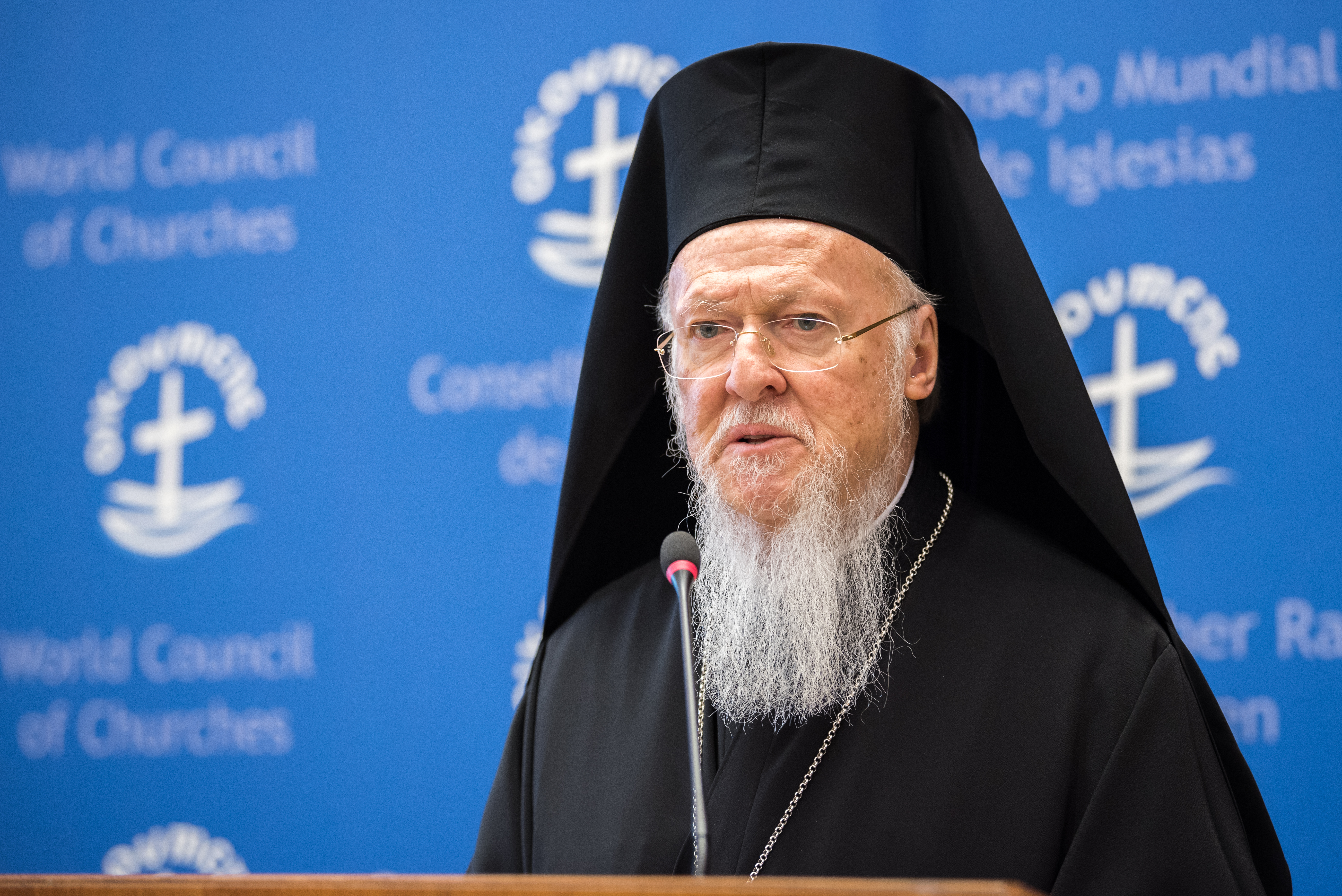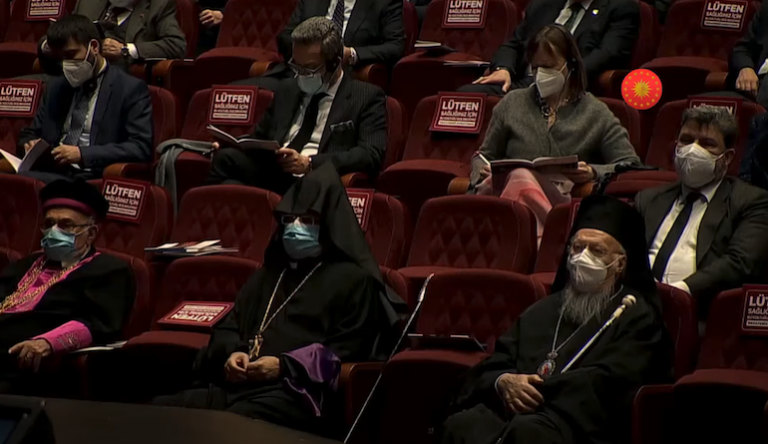 Responding to the invitation of the Presidency of the Republic of Turkey, Ecumenical Patriarch Bartholomew visited Ankara on 2 March 2021, where he attended a meeting held at the Presidential Palace. President Recep Tayyip Erdoğan presented to a large audience, composed of politicians, diplomats, representatives of religious communities and minorities, judges of the supreme jurisdiction, academics and other personalities, a series of political reforms under the title “Program of action for human rights”. During the presentation, the President warmly greeted the Ecumenical Patriarch and other personalities, as well as representatives of religious communities. The President also sent his greetings to the Patriarch on his birthday and presented him with a symbolic present. The Patriarch was accompanied by the Very Reverend Archimandrite Joachim Billis, Chief Secretary of the Holy and Sacred Synod of the Ecumenical Patriarchate.
Responding to the invitation of the Presidency of the Republic of Turkey, Ecumenical Patriarch Bartholomew visited Ankara on 2 March 2021, where he attended a meeting held at the Presidential Palace. President Recep Tayyip Erdoğan presented to a large audience, composed of politicians, diplomats, representatives of religious communities and minorities, judges of the supreme jurisdiction, academics and other personalities, a series of political reforms under the title “Program of action for human rights”. During the presentation, the President warmly greeted the Ecumenical Patriarch and other personalities, as well as representatives of religious communities. The President also sent his greetings to the Patriarch on his birthday and presented him with a symbolic present. The Patriarch was accompanied by the Very Reverend Archimandrite Joachim Billis, Chief Secretary of the Holy and Sacred Synod of the Ecumenical Patriarchate.
Year: 2021
Ecumenical Patriarch Bartholomew congratulated Patriarch Porfirije of Serbia
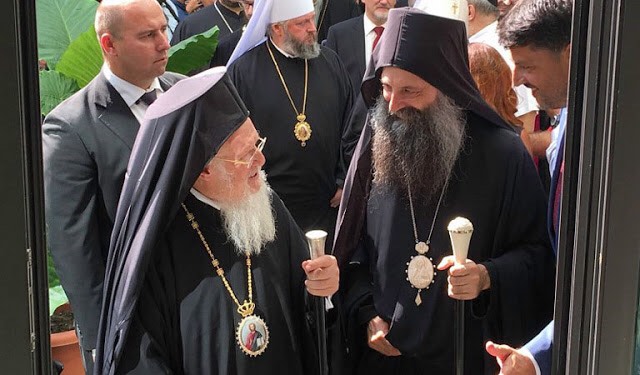 On 18 February 2021, His Eminence Metropolitan Porfirije of Zagreb-Ljubljana was elected as the new Patriarch of the Orthodox Church of Serbia, in the Cathedral of Saint Sava in Belgrade. His All-Holiness Ecumenical Patriarch Bartholomew sent a congratulatory letter to the newly-elected Patriarch of Serbia in which he stated that “the votes came before God and through the election, He whispered affectionately to the ears of the holy clergy and the valuable people of the Church of Serbia.” He stressed that “a brother was added to the successors of our Holy Father Sava, Archbishop of Serbia, who had been ordained and granted autocephaly by our predecessor, [Patriarch] Manuel [of Constantinople] in Nicaea.” “Today you are welcomed with joy, responsibility, toil, agony, and struggle by Christ for the sake of every soul of Orthodox Christians within your local Church,” he added.
On 18 February 2021, His Eminence Metropolitan Porfirije of Zagreb-Ljubljana was elected as the new Patriarch of the Orthodox Church of Serbia, in the Cathedral of Saint Sava in Belgrade. His All-Holiness Ecumenical Patriarch Bartholomew sent a congratulatory letter to the newly-elected Patriarch of Serbia in which he stated that “the votes came before God and through the election, He whispered affectionately to the ears of the holy clergy and the valuable people of the Church of Serbia.” He stressed that “a brother was added to the successors of our Holy Father Sava, Archbishop of Serbia, who had been ordained and granted autocephaly by our predecessor, [Patriarch] Manuel [of Constantinople] in Nicaea.” “Today you are welcomed with joy, responsibility, toil, agony, and struggle by Christ for the sake of every soul of Orthodox Christians within your local Church,” he added.
The Ecumenical Patriarch wished that the patriarchal ministry of the newly elected patriarch “to be long, auspicious and renewed by the Holy Spirit and by the Lord”, underlining that “an important prerequisite and solid foundation of your patriarchal ministry is your devotion to the Divine and Holy Canons and to the Church, which continues to exist by our Scriptures and our works. If you follow this path, you will surely have succeeded in God’s work.” “The Mother Church of Constantinople, from which your local Church was born, congratulates and rejoices in your election. We express to you our undivided love and respect, our dear brother in Christ,” concluded the Ecumenical Patriarch who also had a phone conversation with the newly elected Patriarch of Serbia on that day.
World Council of Churches acting general secretary Rev. Prof. Dr Ioan Sauca also sent a congratulation letter to Patriarch Porfirije of Serbia. “The election of Your Holiness is an encouragement for the entire Orthodox family and beyond,” wrote Sauca in his letter of congratulations. “Your work for reconciliation among Christians and your contribution to the pacification of the Balkans over the past years is a source of inspiration and builds now on the legacy of your worthy predecessor, Patriarch Irinej, who promoted a culture of peace among peoples and nations.”
February Meeting of the Holy and Sacred Synod of the Ecumenical Patriarchate
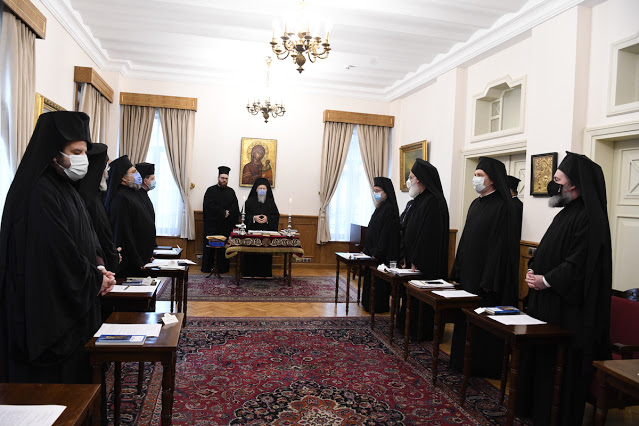
The Holy and Sacred Synod of the Ecumenical Patriarchate convened for its regular meeting on 16-18 February 2021 under the presidency of His All-Holiness Ecumenical Patriarch Bartholomew.
During its meeting, it proceeded to the election of four hierarchs. His Eminence Metropolitan Emmanuel of France was elected as Senior Metropolitan of Chalcedon, in replacement of the former Metropolitan of Chalcedon Athanasios who was put into retirement. His Grace Bishop Kyrillos of Abydos, Professor at the University of Athens and at the Institute of Post-Graduate Studies in Orthodox theology in Chambésy, was elected Metropolitan of Krini and was appointed Patriarchal Exarch at the head of the newly constituted Exarchate of Malta. Also, the Holy Synod proceeded to the elections of auxiliary bishops for the Archdiocese of Thyateira and Great Britain at the request of His Eminence Archbishop Nikitas of Thyateira and Great Britain: the Very Reverend Archimandrite Raphael Pavouris was elected Bishop of Helios and the Very Reverend Archimandrite Iakovos Savva was elected Bishop of Claudiopolis.
Among other things, the Holy Synod reorganized the Synodal Committees in order to ensure their more efficient operation and appointed Archon Paris Asanakis, Lawyer in Piraeus, Athens, Greece, to the position of Legal Adviser of the Ecumenical Patriarchate.
Ecumenical Patriarch Bartholomew on Inter-Orthodox Relations and the Ecumenical Movement
His All-Holiness Ecumenical Patriarch Bartholomew, in a long interview published by the Italian newspaper Avvenire, following an interview with three European newspapers of Christian inspiration, speaks of ecumenism, of confrontation between religions, of intra-Orthodox debates.
Your All-Holiness, you have been ministering for thirty years as Ecumenical Patriarch of Constantinople. How do you see this time, especially the ecumenical encounters you may have had with three Roman pontiffs and with the leaders of other Christian churches?
For all that he has bestowed upon me in all circumstances of my life, I give glory to God. I have never been a supporter of introverted orthodoxy. The mission of the Church is to bear witness to the gospel and to transform the world into Christ, which of course does not happen by remaining indifferent to the gospel or by rejecting it. As a patriarch, I fought for the stability and unity of orthodoxy, for intercultural, interreligious and inter-Christian dialogue, and I took many initiatives for the protection of the natural environment, for peace. and solidarity, for the respect of human rights, the first of which is freedom of religion, always drawing from the inexhaustible source of the Orthodox tradition. And the issue of promoting Christian unity is something that I have always considered central throughout my life.
Continue readingEcumenical Patriarch Bartholomew received UNESCO Special Advisor
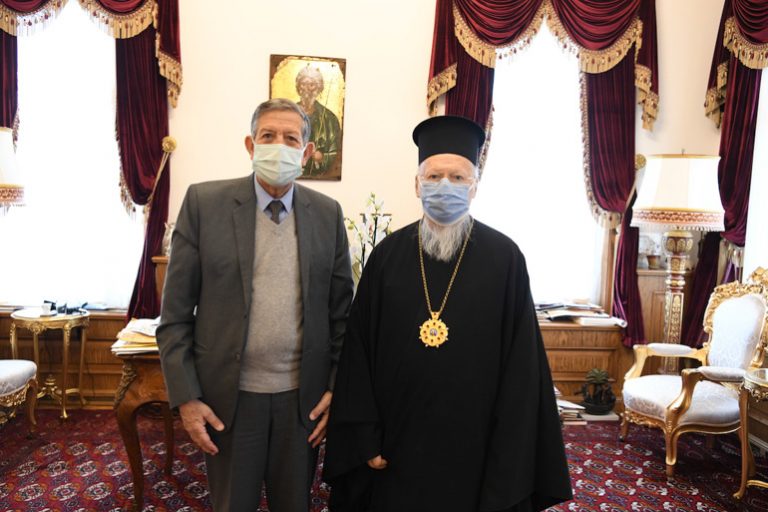
On 2 February 2021, His All-Holiness Ecumenical Patriarch Bartholomew received Mr. Μounir Bouchenaki, Special Advisor to the General Direction of the UNESCO, with whom issues of mutual interest were discussed, including the transformation of Hagia Sophia basilica into a mosque and the similar decision concerning the Monastery of the Savior-in-Chora.
Let us recall that the Ecumenical Patriarch had already received Mr. Bouchenaki in October of last year, and that the patriarch had visited the UNESCO headquarters in Paris seven years ago, where he delivered an address.
Halki Summit IV reflected on COVID-19 and Climate Change
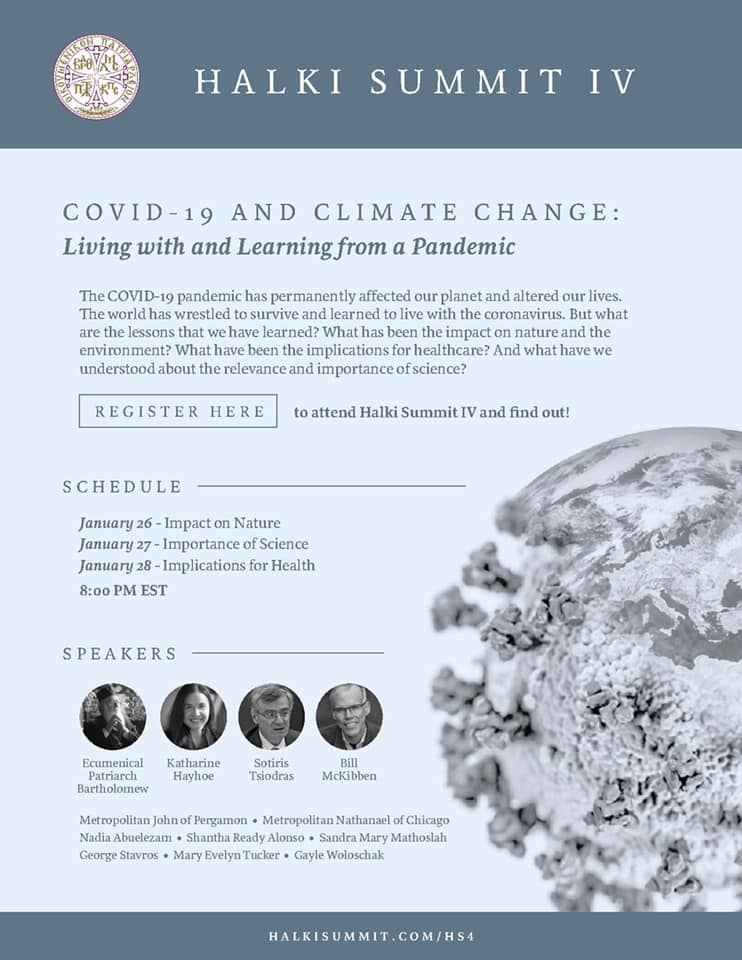
Halki Summit IV met online on 26-28 January 2021 to reflect on COVID-19 and Climate Change. This is the fourth in a series of summits that began in 2012 on the island of Halki. And it is part of a larger program of initiatives by the Ecumenical Patriarchate to raise awareness on climate change and address the need to protect God’s creation. The last event organized by His All-Holiness was held in Athens and on the Saronic Islands in 2018.
This time, the Ecumenical Patriarchate wanted to explore the connections between the pandemic and climate change. The new coronavirus has lowered global carbon emissions. But it has not slowed climate change. At the same time, our response to the pandemic has precipitated the discovery of a vaccine. But it has left the world with a staggering number of deaths.
Much like climate change, the pandemic has permanently affected our planet and altered our lives. The world has wrestled to survive and learned to live with the coronavirus. So we wanted to invite distinguished scientists and economists, theologians and writers, to tell us about the lessons that we have learned. What has been the impact of the pandemic on nature and the environment? What have been the implications for healthcare and the economy? And what have we understood about the relevance and importance of science?
Continue readingEpiscopal elections by the Holy and Sacred Synod of the Ecumenical Patriarchate
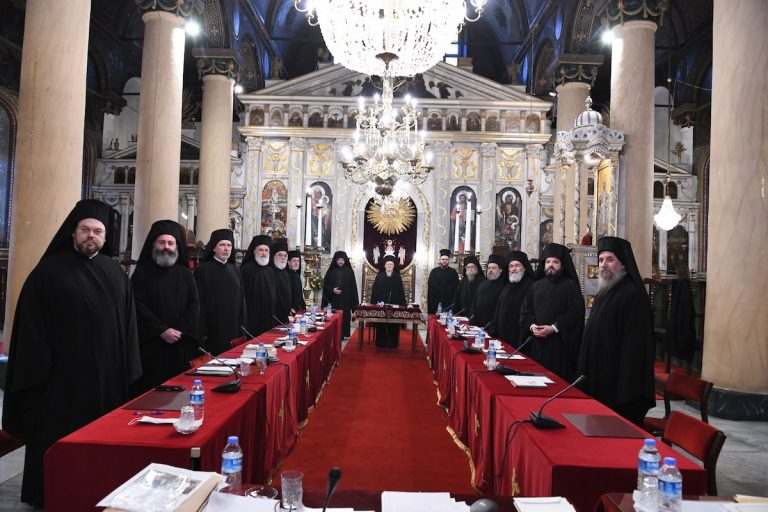
The Holy and Sacred Synod of the Ecumenical Patriarchate convened on 12-14 January 2021 under the presidency of His All-Holiness Ecumenical Patriarch Bartholomew at the Holy Monastery of the Life-bearing Source in Baloukli, Istanbul.
At the proposal of His All-Holiness, the Holy Synod elected His Eminence Metropolitan Polycarpos of Spain and Portugal as the new Metropolitan of Italy, having previously removed from his jurisdiction Malta where a new patriarchal exarchate was created. His Eminence Metropolitan Polycarpos has been educated in Rome and has served for a number of years as priest and protosynkellos of the same diocese.
As the new Metropolitan of Spain and Portugal, the Holy Synod elected the Grand Archimandrite Vissarion Komzias, who will be ordained bishop at the Phanar on 25 January.
Finally, at the suggestion of His Eminence Archbishop Nikitas of Thyateira and Great Britain, the Holy Synod elected his auxiliary bishop, His Grace Bishop Athanasios of Tropaios, as metropolitan of Koloneia (in Asia Minor).
Ecumenical Patriarch Bartholomew’s Interview in “Vima” (Greek Newspaper)
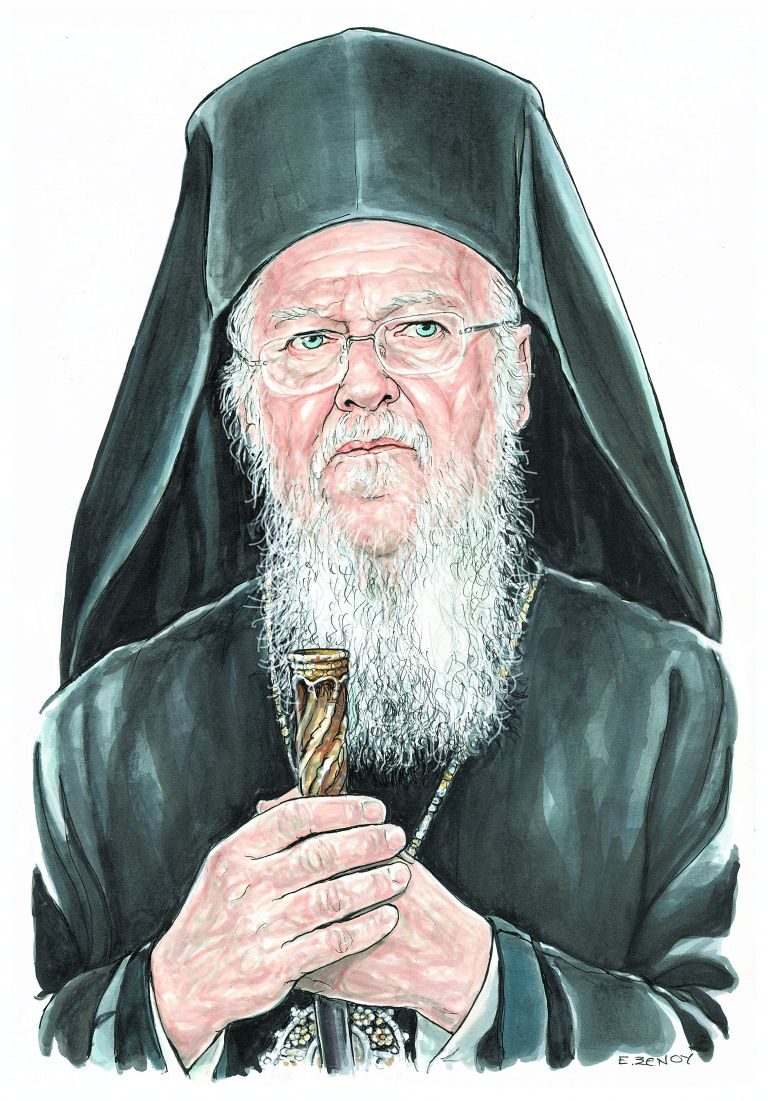
Ecumenical Patriarch Bartholomew in “Vima”: “I don’t have the right to take even one step back.”
Ecumenical Patriarch opened his heart and spoke about the autocephaly of the Church of Ukraine, the pandemic and its deniers. He declared that he will be vaccinated, doing it as an act of responsibility to his fellow human beings, and urged young people to be in solidarity.
The pandemic, young people, the situation within the Orthodox Churches, the “thorn” of Ukraine, the relations with the Moscow Patriarchate and the completion of 30 years since he ascended to the throne of the Archbishop of Constantinople, New Rome and Ecumenical Patriarch, were the main topics of the landmark interview with historic elaboration given to “Vima tis Kyriakis” by Ecumenical Patriarch Bartholomew.
In a rare soul-searching interview, foregoing formal archaisms, the First Primate of Orthodoxy characterized the denial of COVID-19 as unacceptable to the victims and their pain. He rejected the provocative attitude of some clergy against the pandemic, emphasizing that according to the New Testament “he who does not love his fellow human being, cannot love God.” He stated that he is deeply impressed by the self-sacrifice of doctors and nurses, and declared his decision to be vaccinated, calling on young people not to be afraid. Continue reading
Greeting of the Ecumenical Patriarch for the Taizé European Meeting of Young Adults
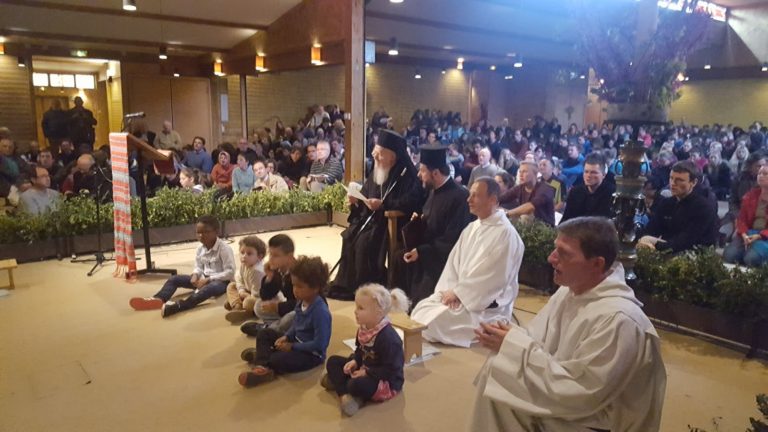
The annual European Meeting of Young Adults organized by the Community of Taizé took place For the first time, the European Meeting of Young Adults was held in Taizé and throughout the world online. The Ecumenical Patriarch Bartholomew sent the following message:
Dear young people,
The year 2020, which is coming to an end, has brought with it its share of uncertainty, suffering and sadness. At the dawn of 2021, we finally see the shining of a light, fleeting and fragile, a way out of the crisis that we will nevertheless have to wait for with patience. Such crises, especially when they are so global, reveal the fragility of our humanity and our deep dependence on this love of God that never ceases to embrace us, although we may no longer be certain of it.
We greet you very warmly and wish to compliment you for taking the time, despite the Covid-19 pandemic, to take part either in person or virtually in the 43rd European meeting organised by the Community of Taizé in a unique form. We sincerely pray that this message will find you all safe and healthy. May the Lord extend his benevolent hand over our planet and all its inhabitants in order to deliver us as soon as possible from this ordeal. In preparing these few words of greeting and encouragement, we have been invited to be more humble and modest. Each year we have the joy of sending you a message from the Mother Church of Constantinople, the Ecumenical Patriarchate, and we are overwhelmed by the sheer tragic magnitude of what 2020 has been and how future generations will judge these events. Continue reading
